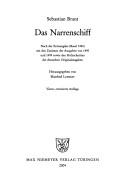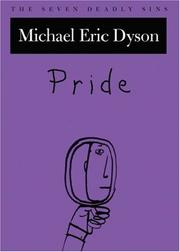| Listing 1 - 10 of 17 | << page >> |
Sort by
|

ISBN: 3484171057 3110933748 Year: 2010 Volume: n.F., Bd. 5 Publisher: Tübingen : Max Niemeyer Verlag,
Abstract | Keywords | Export | Availability | Bookmark
 Loading...
Loading...Choose an application
- Reference Manager
- EndNote
- RefWorks (Direct export to RefWorks)
Sebastian Brants (1457-1521) Hauptwerk Das Narrenschiff (1494ff.) war bis zu Goethes Werther das erfolgreichste Buch in deutscher Sprache. Die Moralsatire führt in 112 Kapiteln ebensoviele Narrentypen und ihre menschlichen Torheiten vor, die Zeitgenossen zur Einsicht und Umkehr zu bewegen. Bemerkenswert ist die enge Verbindung von Text und Bild, die zu ihrer Zeit wesentlich zu Wirkung und Verbreitung des Buches beigetragen hat. Die vierte Auflage der Studienausgabe bietet den Vorteil, daß sie den Forschungsschub im Zusammenhang mit dem 500. Geburtstag des Buchs im Jahre 1994 berücksichtigen kann und damit auch bibliographisch den neuesten Stand darstellt. Brant hat sein Narrenschiff aber nicht nur mit Narren befrachtet, sondern auch mit beträchtlichem Bildungsgut, das 500 Jahre nach Erscheinen des Werkes nicht geringe Verständnisschwierigkeiten bereitet. Um dem heutigen Leser den Zugang zum Text zu erleichtern, bietet die Neuausgabe deshalb erstmals auch "Auskünfte", die Brants zahlreiche Hinweise auf die Bibel, auf Gestalten der antiken Mythologie und Literatur, auf historische wie zeitgenössische Ereignisse und Schauplätze, auf Lehren der Kirchenväter, auf kirchliches wie weltliches Recht u.a. zu erschließen helfen.
Book
ISBN: 9004269045 9789004269040 9789004231313 9004231315 1322237131 Year: 2013 Publisher: Leiden Koninklijke Brill NV
Abstract | Keywords | Export | Availability | Bookmark
 Loading...
Loading...Choose an application
- Reference Manager
- EndNote
- RefWorks (Direct export to RefWorks)
The existence of a early Spanish translation of Erasmus’s Encomium Moriae has been matter of speculation and unsuccessful research for over a century. This volume offers for the first time the edition of a seventeenth-century manuscript discovered at Ets Haim/Livraria Montezinos (Amsterdam) by its editors. They demonstrate that it is not only the first known early modern Spanish translation of Erasmus’s chef-d’œuvre, but a copy of a much earlier version, composed in mid-sixteenth century. This scholarly edition has been arranged for an easy textual collation with the canonical edition (ASD IV: 3) and translation (CWE 27) of Erasmus’s Praise of Folly and includes an extensive apparatus of footnotes devoted both to this version and to Erasmus’s Moriae Encomium itself.
Folly --- Conduct of life --- Pride and vanity --- History.
Book
ISBN: 1800346727 9781800346727 9781789621976 1789621976 9781789622126 1789622123 Year: 2020 Publisher: [Liverpool] Swindon
Abstract | Keywords | Export | Availability | Bookmark
 Loading...
Loading...Choose an application
- Reference Manager
- EndNote
- RefWorks (Direct export to RefWorks)
If this were a novel, the tales of astounding wealth, sexual perversion, murder, munificence, rape, insanity, brutality, slavery, religious mania, selfishness, snobbery, charity, suicide, generosity, theft, madness, wickedness, failure and eccentricity which unfold in these pages would be too concentrated to allow for the willing suspension of disbelief.All these sins and virtues, and more, are displayed by the characters in this book, some exhibiting several of them simultaneously.Folly builders were not as we are. They never built what we now call follies. They built for beauty, utility, improvement; it is only we, struggling after them with our imperfect understanding, who dismiss their prodigious constructions as follies.Follies can be found around the world, but England is their spiritual home. Having written the definitive books on follies in Great Britain, Benelux and the USA, Headley & Meulenkamp have turned their attention to the folly builders themselves, people so blinded by fashion or driven by some nameless ideology that they expended great fortunes on making their point in brick, stone and flint.Most follies are simply misunderstood buildings, and this book studies the motives, characters, decisions and delusions of their builders.If there was madness in their building, fortunately there was no method in it.
Book
ISBN: 0813174279 081317483X 0813174260 9780813174266 9780813174839 9780813174259 9780813174273 Year: 2017 Publisher: Lexington
Abstract | Keywords | Export | Availability | Bookmark
 Loading...
Loading...Choose an application
- Reference Manager
- EndNote
- RefWorks (Direct export to RefWorks)
Motion picture actors and actresses --- La Marr, Barbara, --- Watson, Reatha, --- Deely, Barbara La Marr, --- Lytell, Folly, --- Lytell, Polly,
Book
ISBN: 9783110452259 3110452251 9783110452280 9783110453140 3110453142 3110452286 9783110453157 3110453150 Year: 2016 Publisher: Berlin Boston
Abstract | Keywords | Export | Availability | Bookmark
 Loading...
Loading...Choose an application
- Reference Manager
- EndNote
- RefWorks (Direct export to RefWorks)
"The volume throws fresh light on a major polarity in Euripidean drama, including its roots in the tradition and its reception in vase-painting and literature. Virtually all Euripidean characters are subject to folly and claim some measure of wisdom. Leading international scholars discuss the polarity and the plays' ambiguities from various angles and theoretical perspectives, offering trenchant insights into moral, social and historical issues."--
Greek drama (Tragedy) --- Tragédie grecque --- Wisdom in literature. --- Folly in literature. --- History and criticism. --- Histoire et critique --- Euripides --- Euripide --- Criticism and interpretation. --- Critique et interprétation --- Wisdom in literature --- Folly in literature --- Greek & Latin Languages & Literatures --- Languages & Literatures --- History and criticism --- E-books --- Greek drama (Tragedy). --- Euripides. --- Histoire et critique. --- Ėvripid --- Yūrībīdīs --- Euripedes --- Eŭripido --- Eurypides --- Euripidesu --- אוריפידס --- エウリーピデース --- Εὐριπίδης --- Critique et interprétation. --- Folly. --- Tragedy. --- Wisdom.
Book
ISBN: 2800406321 9782800406329 Year: 1976 Volume: 5 Publisher: Bruxelles : Ed. de l'Université de Bruxelles,
Abstract | Keywords | Export | Availability | Bookmark
 Loading...
Loading...Choose an application
- Reference Manager
- EndNote
- RefWorks (Direct export to RefWorks)
Comparative literature --- Psychiatry --- History of civilization --- Thematology --- History of human medicine --- anno 1500-1599 --- Renaissance --- Folly --- Arts, Renaissance --- Arts de la Renaissance --- Congresses --- Congrès --- 930.85.44 <063> --- -Folly --- -Renaissance --- -#GROL:SEMI-1'15/16' --- Revival of letters --- Civilization --- History, Modern --- Civilization, Medieval --- Civilization, Modern --- Humanism --- Middle Ages --- Conduct of life --- Pride and vanity --- Renaissance arts --- Cultuurgeschiedenis: Renaissance--Congressen --- History --- Conferences - Meetings --- Congresses. --- 930.85.44 <063> Cultuurgeschiedenis: Renaissance--Congressen --- Congrès --- #GROL:SEMI-1'15/16' --- Geschiedenis van de menselijke geneeskunde --- Psychiatrie --- Thematologie --- Vergelijkende letterkunde --- Cultuurgeschiedenis --- Renaissance - Congresses --- Folly - Congresses --- Arts, Renaissance - Congresses

ISBN: 1281156329 9786611156329 0198036477 1435609271 9780198036470 9780195160925 0195160924 0195312104 9780195312102 9781281156327 6611156321 9781435609273 019028966X Year: 2006 Publisher: Oxford ; New York : New York : Oxford University Press ; New York Public Library,
Abstract | Keywords | Export | Availability | Bookmark
 Loading...
Loading...Choose an application
- Reference Manager
- EndNote
- RefWorks (Direct export to RefWorks)
Explores the fate of pride from Christian theology to the social responsibilities of self-regard and regard for the society as a whole. This work examines how pride, within black communities, becomes a necessary defense against a culture that at once formally rejected it in their religious beliefs but embraced it in their social relations.
Pride and vanity. --- Deadly sins. --- Capital sins --- Seven capital sins --- Seven deadly sins --- Sins, Capital --- Sins, Deadly --- Sins --- Sin, Mortal --- Vanity --- Conduct of life --- Deadly sins --- Folly --- Snobs and snobbishness
Book
ISBN: 1299277055 019164448X 9780191644481 9780199696994 0199696993 9781299277052 0191644498 Year: 2013 Publisher: Oxford
Abstract | Keywords | Export | Availability | Bookmark
 Loading...
Loading...Choose an application
- Reference Manager
- EndNote
- RefWorks (Direct export to RefWorks)
Tracing its distant origins to the villa of the Roman emperor Hadrian in the second century AD, the eccentric phenomenon of the ornamental hermit enjoyed its heyday in the England of the eighteenth century It was at this time that it became highly fashionable for owners of country estates to commission architectural follies for their landscape gardens. These follies often included hermitages, many of which still survive, often in a ruined state. Landowners peopled their hermitages either with imaginary hermits or with real hermits - in some cases the landowner even became his own hermit. Those
Garden ornaments and furniture. --- Follies (Architecture) --- Hermitages. --- Hermits. --- Gnomes. --- Fairies --- Anchorites --- Eremites --- Persons --- Hermitages --- Recluses --- Cells of hermits --- Hermits' cells --- Hermits --- Monasteries --- Follies --- Folly (Architecture) --- Architecture --- Pavilions --- Garden fixtures --- Decoration and ornament --- Garden structures --- Outdoor furniture
Book
ISBN: 0585316392 9780585316390 0836136713 Year: 1995 Publisher: Scottdale, Pa. Herald Press
Abstract | Keywords | Export | Availability | Bookmark
 Loading...
Loading...Choose an application
- Reference Manager
- EndNote
- RefWorks (Direct export to RefWorks)
Christian life --- Pharisees. --- Christianity and antisemitism. --- Pride and vanity. --- Pharisees --- Christianity --- Religion --- Philosophy & Religion --- Jewish sects --- Vanity --- Conduct of life --- Deadly sins --- Folly --- Snobs and snobbishness --- Antisemitism and Christianity --- Christianity and other religions --- Mennonite authors. --- Mennonite authors --- Judaism

ISBN: 1281125814 9786611125813 0226467163 9780226467160 9780226467146 0226467147 9780226467153 0226467155 9781281125811 6611125817 Year: 2006 Publisher: Chicago University of Chicago Press
Abstract | Keywords | Export | Availability | Bookmark
 Loading...
Loading...Choose an application
- Reference Manager
- EndNote
- RefWorks (Direct export to RefWorks)
Thanks to her acclaimed volume of poetry and prose published in France in 1555, Louise Labé (1522-66) remains one of the most important and influential women writers of the Continental Renaissance. Best known for her exquisite collection of love sonnets, Labé played off the Petrarchan male tradition with wit and irony, and her elegies respond with lyric skill to predecessors such as Sappho and Ovid. The first complete bilingual edition of this singular and broad-ranging female author, Complete Poetry and Prose also features the only translations of Labé's sonnets to follow the exacting rhyme patterns of the originals and the first rhymed translation of Labé's elegies in their entirety.
POETRY / General. --- Labé, Louise, --- Charly, Louise, --- Perrin, Louise Charly, --- Labé, Louise Charly, --- Labé, --- Belle Cordière, --- Labé, Loyse, --- Labé, Louïze, --- louise labe, renaissance, women writers, female author, sonnets, poetry, petrarchan sonnet, form, troy, elegy, sappho, ovid, bilingual, translation, work literature, france, nonfiction, meter, rhyme, debate of folly and love, canon, marginalized, gender, adaptation, verse, europe, social commentary, passion, desire, intertextuality. --- Labe, Louise,
| Listing 1 - 10 of 17 | << page >> |
Sort by
|

 Search
Search Feedback
Feedback About UniCat
About UniCat  Help
Help News
News